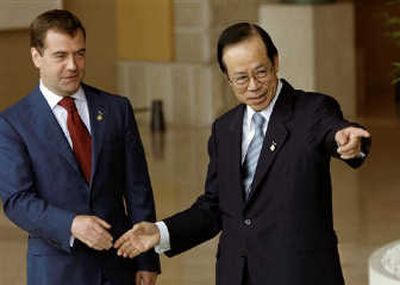G-8 leaders focus on Africa

RUSUTSU, Japan – Aid for Africa – and whether enough was coming from the world’s major economic powers – was in the spotlight today as the Group of Eight nations planned to meet with seven African leaders at its annual summit.
Activists have accused some G-8 countries, particularly France, Canada and Italy, of skimping on aid to Africa, and urged them to ramp up their contributions. The U.S., Japan, Britain, Germany and Russia make up the other members of the G-8.
German Chancellor Angela Merkel also has urged G-8 leaders to take a tough stance on Zimbabwe in the wake of President Robert Mugabe’s widely denounced election win. Mugabe was the only candidate in the presidential runoff after his opponent dropped out amid reports of state-sponsored violence.
President Bush, arriving Sunday for his eighth and final Group of Eight summit, emphasized the urgency of providing aid for Africa, calling on wealthy nations to provide mosquito nets and other aid to prevent children from “needlessly dying from mosquito bites.”
“I’m concerned about people going hungry. We’ll be very constructive in the dialogue about the environment – I care about the environment – but today there’s too much suffering in the continent of Africa,” Bush said during a press conference after meeting with Japanese Prime Minister Yasuo Fukuda.
“Now is the time for the comfortable nations to step up and do something about it,” Bush said.
Africa was at the center of the G-8 summit three years ago in Gleneagles, Scotland, where leaders pledged to double aid to the continent to $25 billion by 2010 and to cancel the debt of the most heavily indebted poor nations.
Advocacy groups for Africa and hunger gave the G-8 a mixed report card on progress in reaching its commitments to Africa.
Collectively, the G-8 has delivered just $3 billion of the $25 billion pledged to Africa in 2005, according to DATA, which stands for Debt, AIDS and Trade in Africa, a group founded by U2 singer Bono and music producer Bob Geldof, both of whom are active in campaigns for Africa.
Germany, the U.S. and Britain were following through on commitments, while progress from Japan, France, Italy and Canada was either unclear or weak, DATA said.
“We desperately need to see more money from the G-8 and for it to be new money,” said Max Lawson from Oxfam International, another advocacy group.
The Organization for Economic Cooperation and Development reported in April that foreign aid by major donor countries slumped in 2007 as debt-relief plans tapered off and amid a global economic downturn in Japan and some other rich nations.
Soaring food prices was another key topic on the agenda at the summit, with some experts predicting that the leaders would announce a food aid package and possibly funds to invest in agricultural development in poorer nations.
French President Nicolas Sarkozy says he has received international support for his idea of creating an experts group to tackle the global food crisis, similar to the U.N.’s Intergovernmental Panel on Climate Change.
“In the 21st century, we must be able to feed the planet,” Sarkozy said in an interview published in Japan’s Yomiuri newspaper today.
Germany’s Merkel said the leaders will confer on how to toughen sanctions against Zimbabwe, and hoped that they would get support from African colleagues on the matter.
South African President Thabo Mbeki, whom Zimbabwe’s opposition has accused of favoring Mugabe, and Nigerian President Umaru Yar’Adua are scheduled to meet with the G-8 leaders. Also invited are the leaders of Algeria, Ethiopia, Senegal, Ghana and Tanzania and the chairperson of the African Union Commission.
Talks were expected to shift Tuesday and Wednesday to climate change as leaders will try to move forward U.N.-led talks aimed at forging a new global warming accord by the end of 2009. The negotiations have stalled because of deep disagreements over what targets to set for greenhouse gas reductions, and how much developing countries such as China and India should be required to participate.
It was unclear whether nations would be able to agree to a goal of cutting their emissions by 50 percent by 2050. A more ambitious goal of setting nearer-term targets for 2020 was considered well beyond reach.